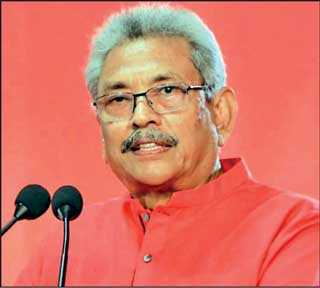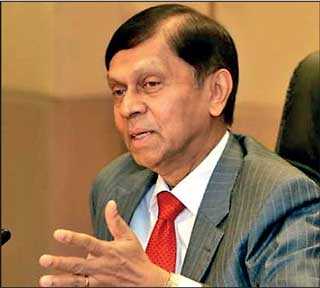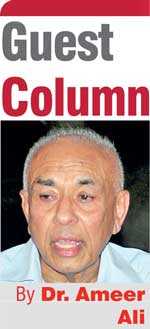Sunday Apr 20, 2025
Sunday Apr 20, 2025
Friday, 9 October 2020 00:05 - - {{hitsCtrl.values.hits}}
State Minister Ajith Nivard Cabraal’s bravado about the economy was more to satisfy the gallery than to convince the discerning. Economists have not forgotten Cabraal’s gamble in 2012 with Greek bonds
 |
| President Gotabaya Rajapaksa |
 |
| State Minister Ajith Nivard Cabraal
|
worth 22 million Euros, when he was the Governor of Central Bank and which ended in a loss of Rs. 3.4 billion to the country.
He has now dismissed the need to seek assistance from IMF’s Rapid Financing Instrument, is guaranteeing effective debt service management, confident of increasing Foreign Direct Investment once the Port City Legislation is completed in a month’s time, and assuring strength in the country’s financial viability and external reserves.
Given this deceptively coloured rosy picture he was questioning the legitimacy of Moody’s downgrading of Sri Lanka’s credit rating, and said that he was talking to several rating agencies, explaining to them about the steady state of the economy. In the meantime, Corona’s third wave is already warning him about false confidence.
LRT cancellation and white elephants
While the State Minister tries to inject an element of resilience amidst a pandemic-driven recession, President GR on the other hand, has hurriedly cancelled, for reasons best known to himself, the badly-needed Colombo Light Rail Transport Project, funded by Japan at a cost of $ 2.2 billion at 0.1% interest rate, repayable over 40 years with another 12-year grace period.
This cancellation, after spending already about $ 19 million on preliminary work, was justified publicly on the dubious argument of ‘high cost and low return’. How did he estimate the low return? Actually speaking, only those nearly two million passengers entering Colombo Municipality Council limits daily would know the real benefit of this project.
With increasing population and economic push from the countryside, that number is set to increase in  the future, which will make commuting even more hazardous and time consuming. Even then, how would the Government compare the benefits from this investment with the $ 104.3 million investment on the Lotus Tower, with money borrowed from China’s EXIM Bank at the rate of 11% interest? Or, how great are the benefits from the Mattala Airport built by China at a cost of $ 270 million? And what was the benefit in monetary terms from Sooriyawewa Cricket Stadium which cost Rs. 4 billion?
the future, which will make commuting even more hazardous and time consuming. Even then, how would the Government compare the benefits from this investment with the $ 104.3 million investment on the Lotus Tower, with money borrowed from China’s EXIM Bank at the rate of 11% interest? Or, how great are the benefits from the Mattala Airport built by China at a cost of $ 270 million? And what was the benefit in monetary terms from Sooriyawewa Cricket Stadium which cost Rs. 4 billion?
The present regime has an all-time record of creating white elephants in the name of development. Now it has cancelled a worthwhile project that really has long-term benefits for millions of passengers entering CMC area by cutting time wasted on roads owing to traffic congestion. The new traffic rules introduced recently has worsened the situation and will push economic productivity downwards.
True economic picture
Be that as it may, it is time the people are told of the true picture about the economy. This is because economic agencies like the Central Bank have surrendered their independence at the feet of the President.
The President, soon after appointing the new Professor Governor, got frustrated with the academic’s intellectual financial economics, hurriedly called a meeting with member of the Monetary Board and told them in no uncertain terms that they should assist in implementing his economic policy. The President then went on to appoint his own men and woman to the Board to make it more compliant. The Central Bank soon accelerated money printing and argued that it was increasing liquidity to revive the  economy.
economy.
Where is the bank’s much-touted independence? It is because of this brazen political interference in the operation of high-powered economic and financial institutions that one has doubts about the Government’s published information about the economy. Cabraal’s bravado is part of this game.
Borrowing from one source to service debt incurred from another is no way to become debt free. Not only that, it is a crime for the living generation to pass its debt burden to coming generations, who are not party to current mismanagement. No one seems to question the apparent injustice buried in this modern transfer problem. This is why the country needs a comprehensive economic plan with pragmatic targets and time line to reach those targets, along with market-based incentives to mobilise all available resources, mainly human.
The emerging political order with expected constitutional changes is a discouragement to such a coordinated and collective task. That order will be Stalinist but nepotist and divisive.
Ad hoc economic actions
From the time GR became the President his actions on the economic front have been ad hoc, as if they emanated from thought bubbles. For example, his decision to clamp down imports without thinking of its revenue effect has created a public finance deficit. Similarly, his policy regarding import substitution and self-sufficiency in essentials lack concomitant measures regarding incentives for local production and distribution.
It is this tendency for uncoordinated action that is reflected in his recent utterance that his verbal orders should be treated as circulars. Economic measures and actions have linkage effects and to pronounce a measure without thinking through those effects is not the way to promote steady growth. An economy cannot be built in a patchwork manner. It needs a coordinated approach. At least the forthcoming Budget should reflect this need.
It is in this context that 20A poses not only a threat to democracy but also to peace and tranquillity in the country, without which economic prosperity will be a mirage. It appears that GR hopes to maintain peace and tranquillity through use of force. If peaceful changes are made impossible, violent changes become inevitable. At least one or two members in the ruling camp seem to realise this truth. We hope their influence brings some sanity to that madhouse.
(The writer is attached to the School of Business and Governance, Murdoch University, W. Australia.)